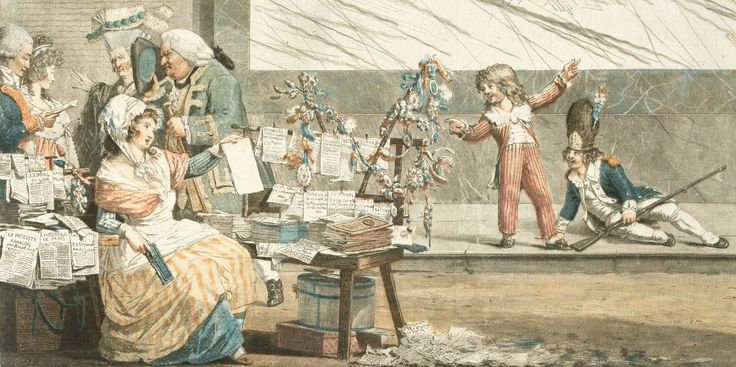Part 1 - La République des Lettres: literary and artistic women
This section comprises women who promoted the ideals on the Revolution by the means of letters and art, among others authors, playwrights, journalists, actresses, singers, painters, composers etc. However, many women who worked in the „entertainment business“ such as actresses and singers, were reliant on royal and aristocratic patronage, which meant for many of them not only that the Revolution cut off their professional prospects, but also that they opposed the Revolution altogether. In this diverse list, I present women who used primarily literary or artistic means to express their support for the Revolution. Note, however, that the boundaries between this and other sections may be fluid.
Stéphanie Félicité, comtesse de Genlis (1746-1830), author, musician and educator; a friend of Philippe Egalité and edicator of his daughters, and a reknown liberal, she welcomed the Revolution and visited the Cordeliers club, at least once taking her pupil Adélaïde d'Orléans with her. In her salon 1789-1791, she welcomed, among others, progressive members of the Constituante, like the Lameth and Barére. However, she exiled in 1793.
Amélie-Julie Candeille (1767 - 1834), singer, composer, actress and playwright; she was an abolitionist in the Société des Amis des Noirs and wrote plays against slavery. She was very closely linked to the girondists, but escaped persecution. Find her portrait here and her Wikipedia entry here.
Olympe de Gouges, form. Marie Gouze (1748 – 1793), playwright and pamphletist; living as a courtesan after being widowed at a young age, she soon turned to literature, writing plays in which she voiced her abolitionist and feminist views. A constitutional monarchist, she at first welcomed the Revolution, but was disappointed when it failed to grant women the same rights as men. Being both, a democrat while remaining somewhat a moderate and a constitutional royalist, she soon opposed the jacobins vehemently and was guillotined in November 1793. Here’s her portrait and here her Wikipedia entry.
Louise-Félicité Kéralio-Robert, (1756 – 1821), academian, historian, editor, journalist, jacobin. Her views cannot be considered as “feminist” in our contemporary sense, for she favoured the exclusion of women from the political sphere. Apart from that, she acted as a “liberated woman”, being the first female editor-in-chief of a journal and signing her articles, in which she voiced views independent from her husband’s, with her own name. Her pressumed portrait is here, and here her Wikipedia entry.
Marie-Sophie Lapierre, (born around 1770-1775), a former teacher, tailor and ultimately singer, she used to sing revolutionary, radical-democratic chansons in the Bains Chinois, the rallying point of the babouvists; a member of the conspiration des égaux, she was accused with them and distinguished herself with mocking the jury and president. Sophie was released, and fell into obscurity afterward.
Mlle Jodin, wrote a pamphlet named Vues législatives sur les femmes (1789), in which she pleads for the right do divorce and the institution of a Female tribunal, employed in uniquely female matters, and composed by women; and in 1790 : “Et nous aussi nous sommes citoyennes.” (And we, too, we are citizenesses ; meaning we as women, too, have civil rights.)
Jeanne-Rosalie Tillet-Guillodon-Saudraye, a creole and wife of the Academie française member Charles-Joseph Lohier de la Saudraye, who was a council in Saint-Domingo before the Revolution. She adopted the republican ideals, despite being a « moderate » jacobin, attended Jacobin meetings, and prepared a short report on the historical origins of the phrygian bonnet which she presented at a session in Vesoul.
Germaine de Staël (1766-1817), author and philosopher.Daughter of Necker, married to a Swedish noble-man, was initially favourable towards the Revolution. However, she pled in favour of a constitutional monarchy and thus had to exile several times after 1792. Here’s her portrait, and her Wikipedia entry can be found here.
Jeanne-Rosalie Tillet-Guillodon-Saudraye, a creole and wife of the Academie française member Charles-Joseph Lohier de la Saudraye, who was a council in Saint-Domingo before the Revolution. She adopted the republican ideals, despite being a « moderate » jacobin, attended Jacobin meetings, and prepared a short report on the historical origins of the phrygian bonnet which she presented at a session in Vesoul.
Germaine de Staël (1766-1817), author and philosopher.Daughter of Necker, married to a Swedish noble-man, was initially favourable towards the Revolution. However, she pled in favour of a constitutional monarchy and thus had to exile several times after 1792. Here’s her portrait, and her Wikipedia entry can be found here.
Constance de Théis (1767-1845), poet and literate. Born into a noble family which emigrated during the Terreur, she returned to France during the Directoire when she made herself known as a lyrical playwright and author. Among other, she published, in 1797, an « Epître aux femmes », in which she voiced feminist views and claimed that women and men were equal despite their differences. Marie-Joseph dubbed her « la Muse de la Raison ». Here is her portrait.

Keine Kommentare:
Kommentar veröffentlichen